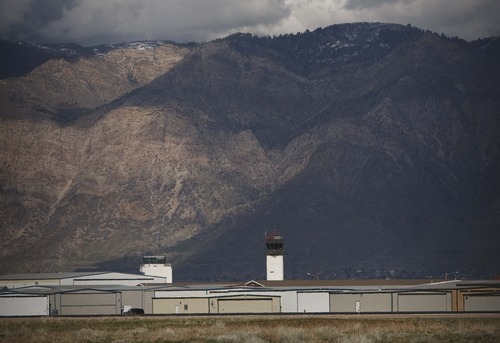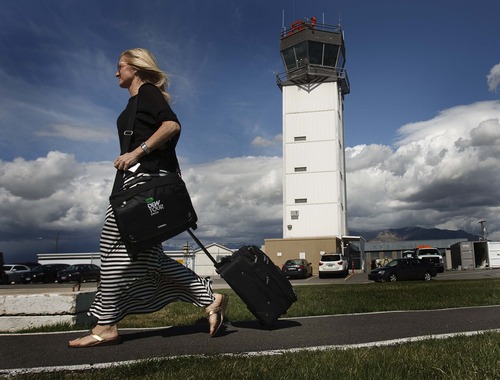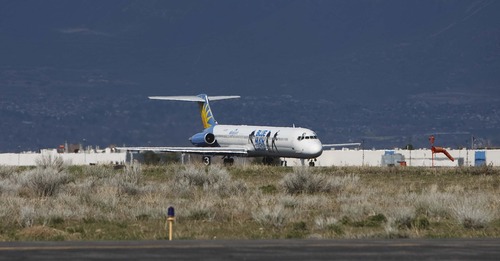This is an archived article that was published on sltrib.com in 2013, and information in the article may be outdated. It is provided only for personal research purposes and may not be reprinted.
Transportation Secretary Ray LaHood has assured lawmakers the Obama administration will prevent the closure of 149 small airport towers — including two in Utah — as well as end furloughs of air traffic controllers nationwide.
The actions are the result of legislation passed by Congress, according to officials involved in negotiations on the bill.
The disclosure came as senators sought signatures on a letter to LaHood saying that their support of the legislation "was based on the understanding that the contract towers would be fully funded" at least through the end of fiscal year, Sept. 30. In all, 149 towers are ticketed for possible closure beginning June 15 as the FAA carries out its share of the $85 billion in across-the-board budget cuts that took effect in March at numerous federal agencies.
The letter said the towers, which are staffed by employees under contract to the FAA, are a "vital public safety and economic development asset for dozens of communities — many of them rural — in every corner of the country." It was circulated by Sens. Jerry Moran, R-Kan., and Richard Blumenthal, D-Conn.
The news was welcomed by Provo Municipal Airport manager Steve Gibson, who now believes that his control tower and the one at Ogden-Hinckley Airport will be spared, at least for now.
"We are really excited about that," Gibson said. "That's great news for the safety of aviation in Utah."
Royal Eccles, airport manager at Ogden-Hinckley, was more guarded because he had not heard confirmation that his tower would remain open.
"Right now, this sounds great," he said. "But without confirmation from the Utah delegation or my trusted sources, I trust this as far as I can throw a piano."
The developments coincided with congressional passage during the day of a follow-up bill that fixed a stenographic error in legislation that cleared late last week. It was designed to give LaHood flexibility to shift up to $253 million among various accounts to "prevent reduced operations and staffing of the FAA," but the original measure lacked the letter "s" on the word "accounts."
President Barack Obama was expected to sign the bill quickly.
Sen. John Thune, R-S.D., the senior Republican on the Senate Commerce Committee, said he met with LaHood on Thursday and spoke with him again the following day about the legislation. "I think his expectation is there is enough money and enough flexibility for him to" keep the towers open and end the furloughs of FAA employees, the South Dakotan said in a telephone interview.
He added that when he and Sen. Jay Rockefeller, D-W. Va., met last week with LaHood and FAA administrator Michael Huerta, "it was understood they would take care of both of those issues if we gave them the money." Other officials said LaHood had provided similar assurances, although they asked not to be identified because they lacked authority to be quoted by name.
The impetus for the legislation was private pressure from the airlines whose business was disrupted by air traffic furloughs, coupled with public outrage from travelers who were forced to endure delays.
But political calculations also figured into a mini-drama that resulted in the bill's passage late last week, as Obama and Republicans continue to blame one another for the inconveniences caused by across-the-board spending cuts.
The White House abruptly retreated under pressure last Wednesday when it indicated it would accept an easing of the FAA cuts while leaving the balance of the $85 billion in reductions unchanged. Given lengthy political struggle surrounding across-the-board cuts, the issue was sensitive enough so that when Sens. Susan Collins, R-Maine and Mark Udall, D-Colo., initially proposed legislation that explicitly said the measure would assure the towers remain open, Senate Majority Leader Harry Reid, D-Nev., objected, according to several officials briefed on the discussions.
The wording was altered to drop the explicit reference, although the flexibility to keep the towers open was retained.
Huerta testified recently that the cost of canceling FAA furloughs would be $220 million through Sept. 30, leaving about $33 million in freed-up funding to maintain the towers. He also said the agency is working with about 50 communities and airport operators in hopes of arranging alternative funding.







